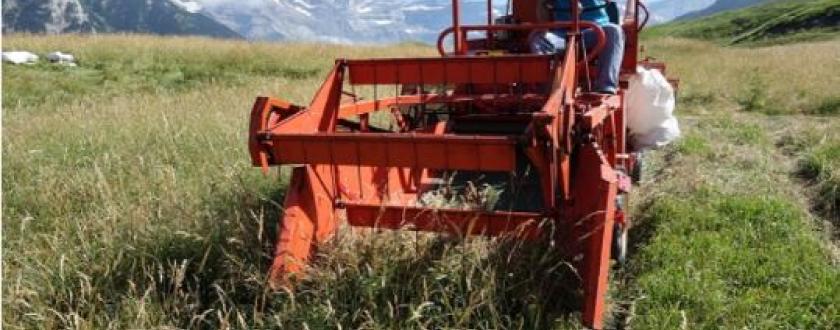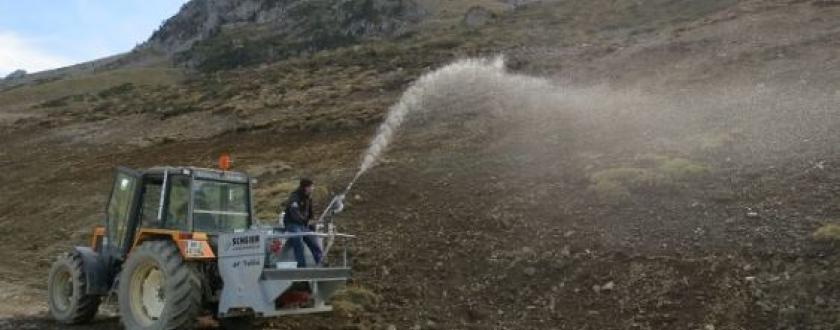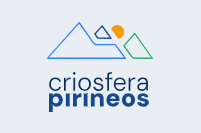Ecovars 3D. Practices and local seeds for restoring mountain areas
Description of the case study
Since 2003, the Conservatoire botanique national des Pyrénées et de Midi-Pyrénées (CBNPMP) has been developing more eco-friendly revegetation practices in the Pyrenees through the Ecovars 3D project. The programme provides guidance to managers of mountain areas (ski resorts, municipalities, natural parks, farms and livestock operations, etc.) around best practices for enhancing topsoil and planting local species.
After three consecutive editions, the Ecovars programme is also taking forward projects for ecological restoration and cultivation of local species for use across the entire Pyrenees region under the brand Pyrégraine de nèou.
For more than 15 years, the main challenge for the Ecovars project has been to incorporate the revegetation of degraded slopes and other land as an ecological restoration technique within technical and environmental plans for various sectors, including ski resort management, public works or mountain livestock operations.
The project also seeks the willing involvement of all stakeholders by providing relevant training and providing them with autochthonous seeds for use in their daily operations, in place of non-native seeds which are less adapted to the Pyrenean context.
The objectives of the Ecovars 3D project are as follows:
- reintroduce a variety of native Pyrenean plants to project soil from erosion.
- improve snow conservation at ski resorts.
- increase the climate change resilience and adaptation of degraded sub-Alpine pasture.
- reduce the use of chemical inputs on protective pastures by changing to autochthonous species which are better adapted.
- produce and market autochthonous seeds through local short routes to sale.
The actions taken forward in the project are as follows:
- training the various stakeholders involved in managing degraded pasture about the benefits of using local autochthonous seeds.
- regular guidance for managers on how to maintain autochthonous vegetation.
- enhancing topsoil through use of seeds which are more suitable to the time of year.
- supporting seed producers and gatherers to develop appropriate species mixtures.
- creation of the seed brand Pyrégraine de nèou to guarantee local origin and quality.
Case study developed and partially implemented as a climate change adaptation measure.
Conservatoire botanique national des Pyrénées et de Midi-Pyrénées (CBNPMP), Región Nouvelle-Aquitaine, Región Occitanie, the French department of Pyrènèes Atlantiques, Commissariat Général á l'Egalité des Territoires, the Pyrénées Catalanes and Pyrénées Ariégeoises natural parks, CNRS, ski resorts (Grand Tourmalet, Superbagnères...), EDF, ENEDIS.
Additional Information
The project has been promoted by Conservatoire botanique national des Pyrénées et de Midi-Pyrénées (CBNPMP) since the first edition in 2003. Since then, it has been supported by the following partners: the regional governments of Nouvelle-Aquitaine and Occitanie, the French department of Pyrènèes Atlantiques and the Commissariat Général á l'Egalité des Territoires. Various local stakeholders from across the French Pyrenees have also become involved, including the Pyrénées Catalanes and Pyrénées Ariégeoises natural parks, natural reserves, CNRS research teams, French communes, mountain agriculture stakeholders, ski resorts (Grand Tourmalet, Superbagnères and others), quarries, EDF, ENEDIS, consultants and engineers, revegetation businesses, etc. Several meetings and site visits have been organised to facilitate work with these stakeholders, in addition to the direct communication channels with those involved (email list, website, newsletter).
Success: long project duration enables implementation across the entire French Pyrenees region; creation of a local brand guarantees quality and visibility of the product/service.
Limiting: access to local seeds and location of enclaves for gathering them; difficulties in agreeing seed sale prices; lack of research on the beneficial effects of revegetation in specific high mountain ecological contexts.
A new study will be published in 2019 which analyses and positively appraises the benefits of using local seeds over conventional species relative to ecosystem services.
The Ecovars programme started out as an experimental project in the Parc National des Pyrènèes focussed on innovation in ecological restoration. It has since been extended to other regions and sectors within the Pyrenees until becoming an autonomous business initiative which enjoys institutional support from the Conservatoire botanique national des Pyrénées et de Midi-Pyrénées.
2003-2019 (16 years - in progress)
Reference information
PYRENEAN CLIMATE CHANGE OBSERVATORY
Avenida Nuestra Señora de la Victoria, 8
22.700 - Jaca
Huesca - España
+34 974 36 31 00
info_opcc@ctp.org






